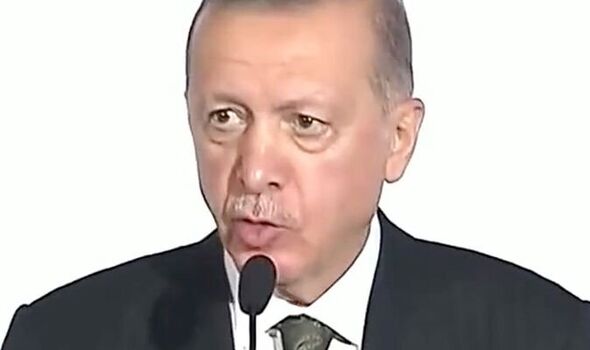
Recep Tayyip Erdogan’s uncompromising stance on a potential invasion of Greece has reignited tensions in the Aegean Sea, prompting questions about Turkey’s membership in NATO. Erdogan asserted that Turkey would strike against anyone interfering with its objectives in the region, leaving many to wonder why a nation with imperialistic tendencies and perceived as a terrorist threat, similar to Russia, remains part of the NATO alliance.
The longstanding rivalry between Turkey and Greece over control of the Aegean Islands has escalated, fueled further by a recent oil deal between Ankara and Libya. During a meeting in Prague, Erdogan reiterated his readiness to take up arms against Athens and any other nation deemed a hindrance to Turkey’s interests. In response to inquiries about the seriousness of his threats, Erdogan emphasized that the response was applicable to any country bothering or attacking Turkey.
President Erdogan dismissed the possibility of constructive discussions with Greece, accusing Athens of basing its policies on lies and asserting that there was nothing to discuss at the moment. This uncompromising stance deepens the diplomatic rift between the two nations.
Ankara recently announced an agreement with Tripoli to jointly explore hydrocarbon reserves in Libya’s national territory, a move contested by Greece. The memorandum prompted Greek objections, claiming it would encroach upon Greek waters. Turkish Foreign Minister Mevlut Cavusoglu warned NATO partners not to expect friendship if they supported Greece’s alleged control over the disputed area.
“Their entire policy is based on lies, they are not honest. We have nothing to discuss with Greece,” Erdogan reiterated, underscoring the strained relations.
Tensions further escalated as Erdogan confirmed plans to bolster Turkey’s military presence in Cyprus, following the lifting of a Washington-imposed arms embargo on the Greek Cypriot administration. Cyprus has been divided between Turkish and Greek administrations since 1974, with only the Greek section internationally recognized.
In a briefing, State Department spokesman Ned Price offered support to Greece in the ongoing tensions, emphasizing that Greece’s sovereignty over the islands was not in question. While acknowledging Greece’s territorial integrity, Price called on all countries, including allies, to respect sovereignty and avoid actions that could escalate tensions in the region.
The intensifying rhetoric and military posturing raise concerns about the stability of the Aegean Sea and the potential ramifications for NATO, sparking debates about whether Turkey’s actions align with the principles and objectives of the alliance.
RELATED ARTICLES
- Hungary Becomes First EU Country to Congratulate Putin for Winning the 'Elections'
- Putin says NATO Troops are already in Ukraine But Russia is Still Winning
- After Russian Threats, Romania Begins Building the Largest NATO Base in Europe
- France says Ukraine Must Free Crimea in Order to Have Lasting Peace
- Russian Ambassador to Washington calls USA "terrorist state", says Conquering of Ukraine will Weaken USA











